Living and Learning – I can make democratic decisions
This week, we have been discussing in class what it means to be part of a democratic decision.
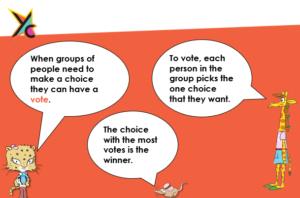
We had a vote on who the two new Junior Leadership Team (JLT) representatives from our class would be. Some children gave a short speech on why they would be a good member of the JLT and what they wanted to see more of or change within our school. Afterwards, we had a secret ballot in our classroom where we all voted for the person we wanted. We discussed how sometimes things might not go our way but we have to be respectful to the decision.










Super Sentences
Year 4 having been working hard with their writing. To compliment our History learning about Ancient Greece, the children had to put themselves into the shoes of a Greek Warrior and write a recount.
What is a recount?
A recount is written in the past tense about events that have happened. Examples of texts that are recounts include: diaries, an account of a school event or trip out, an historical account of events, letters and postcards, newspaper articles and retelling well-known stories. The class enjoyed listening to the children’s author Michael Rosen who gave us his top tips on how to write an engaging recount.
Share this at home by visiting https://www.youtube.com/watch?v=Re0pCqUZu9w .
We had some fantastic, descriptive sentences and accurate use of adverbs and prepositions. After editing their work, some of the children enjoyed reading their recounts to the rest of the class. This was a good opportunity to focus on some of our oracy targets: to read with volume and prosody. Can your child tell you the definition of the word prosody?



Here’s a selection of our work.
After that, I went to the market which was taking place between four statues. These had been carefully sculptured by our citizens. Noah
Finally, I felt happy because I was home. Adrian
The Parthenon towered high above me. Summer
Patiently, I stood waiting on the boat. Evie
As I walked carefully up the steep steps, I saw a gold statue in front of the building. Amelia
As I walked up the hill, I spotted my best friend soaring high above. Gracefully, he landed on my arm. Kamile
The boat drifted gently across the sea. It was taking me home. Lilly
As I approached Athens, I felt joyful to see my homeland. Murielle
Proudly, I stood on the dusty path watching the people around me. Ashton
In front of me stood eleven, magnificent columns. Sadly, I thought about my friends who had been lost in the war. James
Standing on the step, I studied the statues which stood proudly shining in the sunlight. War can take its toll on a man! Ralph
Well done, Year 4!
Mark making madness!
Nursery have been getting very creative this week. We have continued with our conker rolling with paint and have started to look at how colourful Autumn leaves can be. We have used our leaves to do rubbings on paper using large crayons to explore the marks they can create. We took our mark making on to a larger scale and used our giant chalks to transform our outdoor space.
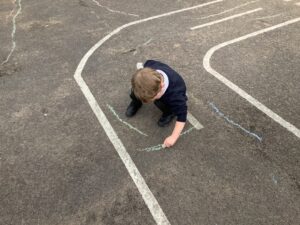
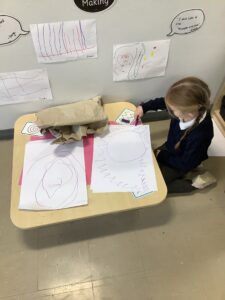
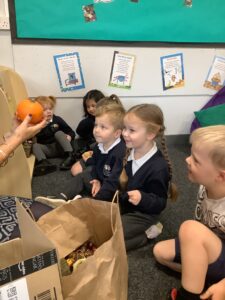
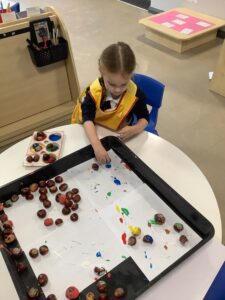
Reminder!
Don’t forget you can send in your photos to our email address so the children can talk about what they have been doing over the weekend.
stjamesnursery@spherefederation.org
Have a lovely weekend!
Miss Ward
spellings 14th October 2022
We will be learning about adding the suffixes ‘ing’ and ‘ed’ to a root word:
– answer/ answered/answering
– arrive/ arrived/arriving
– call/ called/ calling
– think/ thought/ thinking
– smile/ smiled/ smiling
Year 3 love reading!
We have been enjoying our sessions to develop our love of reading in class. This happens through our weekly ‘book club’ sessions and on Friday mornings, where we visit the school library. The children have access to fiction books which can be taken home and non-fiction, which are good to ‘dip’ into during short reading sessions.
The children have been sharing their favourite books and discussing their preferences when choosing books.
I’ve loved seeing the comments about home reading in Year 3’s reading records.  Please make sure you leave a short comment when reading with your child.
Please make sure you leave a short comment when reading with your child.

Reading: If this is the answer, what is the question?
During our daily reading lessons, your child continues to learn about comprehension – hunting for answer in a text.
Each week, we have one specific text that we read and read and read each day. Re-reading is a great way to become more familiar with a text and helps make us better readers.
This week, we’ve been reading about invertebrates. Check out the challenge we had a go at this week: if this is the answer, what is the question? Devising and posing our own questions helps us to really get to know the text as best as we can.

Great job, Year 4!
Friday 14th October 2022
This week, are spellings are homophones – words that sound the same but are spelt differently and mean different things. Your child needs to know which word is the correct version when given a sentence with a homophone in!
Why not check out this short animation alongside your child when practising spellings each day.
there/their/they’re
to/two/too
eight/ate
bored/board
stairs/stares
waist/waste
write/right
knight/night
your/you’re
break/brake
School photographs
On Monday, the children are having their school photograph taken. This is usually our PE day. Please can children come to school in their school uniform and not PE kits.
This week’s message (Friday 14 October 2022)
This week’s message includes some ways to support your child at home with Maths, written by Mrs Allaway, the Sphere Federation Maths Leader. Sandwiched in between, a couple of useful reminders…
School day
Have you let us know your thoughts on changes to the school day? Our very short survey is open for one more week.
Maths
What are we learning in Maths?
In Key stages 1 and 2, our Maths curriculum is divided into blocks of learning. These include different aspects of maths such as place value, addition and subtraction, multiplication and division, geometry, fractions, measures and statistics. Each block is broken down into a sequence of small manageable steps in learning, with each step building on the previous one.
Years 1 and 2
In the autumn term, our blocks of learning are place value, addition and subtraction, and shape.
A significant amount of time is spent on developing a deep understanding of the composition of numbers so that children become confident and fluent in both counting and recalling number facts. The crucial number facts are simple addition and subtraction facts. Regular short bursts of practice on NumBots will help with this. In school, we use a wide range of practical resources to support understanding of these key concepts.
When learning about shape, children are supported to recognise, draw, compare and sort different shapes alongside using the related mathematical vocabulary.
Years 3 and 4
In the autumn term, we cover three blocks of learning: place value; addition and subtraction; and multiplication and division.
It’s essential that children become increasingly fluent with whole numbers and the four operations, including number facts. These facts need to be really secure so that children can develop efficient written and mental methods and perform calculations accurately with increasingly large numbers. Times Tables Rock Stars will help with learning times tables up to 12 x 12.
We continue to use a range of practical resources. We use these to support children’s understanding of concepts and procedures – so they can see the maths. Ultimately, the expectation is that children can do the maths without the resources.
Years 5 and 6
In the autumn term, our blocks of learning are place value, the four operations (addition, subtraction, multiplication and division) and fractions.
Children extend their understanding of the number system and place value to include much larger numbers – up to 10 million.
Children are supported to become fluent in written methods for all four operations, including long multiplication and division. Children develop their skills to solve a wider range of increasingly complex problems that draw on these arithmetic skills.
When learning about fractions, children develop their understanding of equivalent fractions and use these to add and subtract fractions with different denominators. In order to be successful with this, children need to be fluent with times tables. Short bursts of regular practice on Times Tables Rock Stars will help to keep these skills sharp.
As always, speak to your child’s teacher if you’ve any questions, comments or concerns about your child’s learning in Maths.
JLT elections
We’ve recently launched this year’s Junior Leadership Team election process. Our Junior Leadership Team is one of the ways that children are encouraged to take an active part in pupil voice.
The election process allows children to develop an understanding of one of the British Values, democracy, with two representatives from each class chosen democratically by their peers.
Here are some of the qualities our junior leaders think are needed to be an effective JLT member.
- use the 8Rs for learning
- be respectful and polite
- help others
- be a good speaker and listener (to members of your class and in the meetings)
- share and be confident with your ideas
- let others speak
- accept the views of others even if you don’t agree
- be friendly and approachable
- follow our school rules and make good choices in class and around school
This weeks’ whole school homework is all about the election and democracy, ready for the elections next Thursday 20 October.
Have a happy and healthy weekend.
Week 6
Thank you to everyone who joined us for our funky phonics session this week. We loved welcoming you into our classroom, so we could share our fantastic phonics learning with you. There will be lots of opportunities for you to join us in the classroom so please keep an eye out for future dates.
We have had a super Autumn week in Reception. Our focus book has been leaf man and we have had lots of lovely discussions about Autumn and the changes that we see. We used our treasures that we found on our Autumn walk to create our own leaf people!
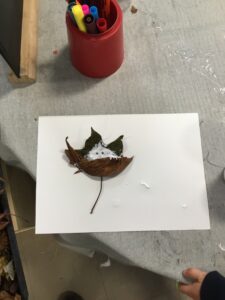
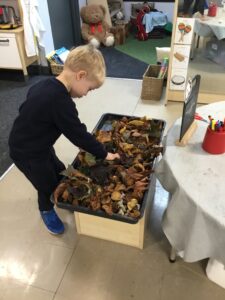
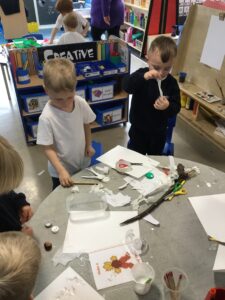
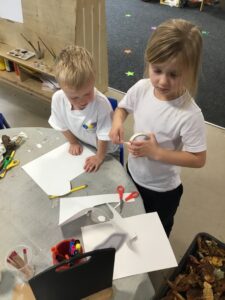
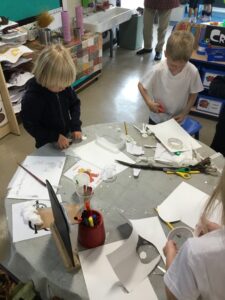
We loved looking at the different trees on our Autumn walk and decided to create our own Autumn tree images. We thought carefully about the different colours we saw and how the leaves were on the trees and also on the floor.
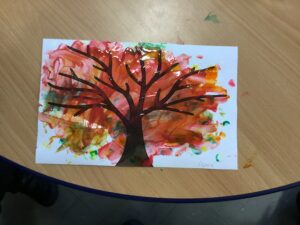
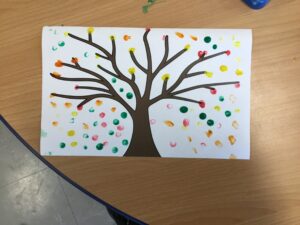
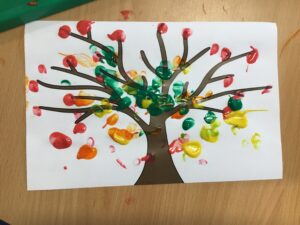
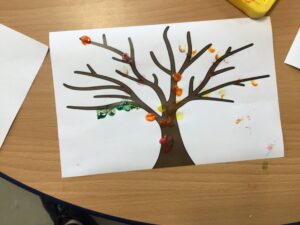
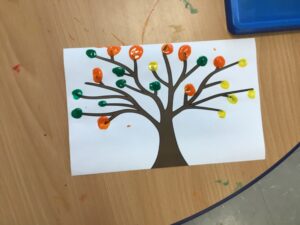
Maths, maths everywhere! We have been using our maths learning to help us with a game of skittles. It was lots of fun trying to knock as many down as possible and then counting who had knocked down the most.
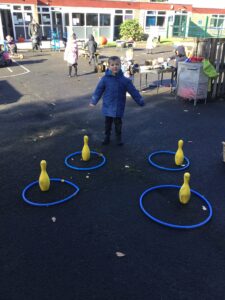
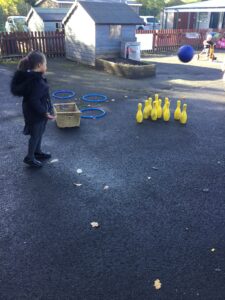
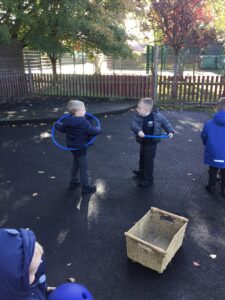
Could you be our next maths superhero? In class we have decided that we would like to reward someone for working really hard in maths. If you are nominated you get to wear our maths superhero cape and eye mask in class. Please send any super home maths work into school so we can share it with everyone.
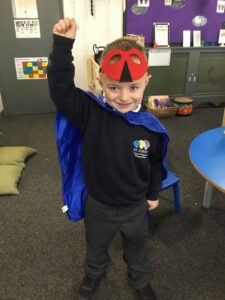
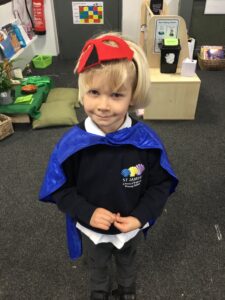
Next week we have parent teacher consultations in school. If you have not already made an appointment and would like one please let me know.
Happy weekend everyone!
Mrs Payne